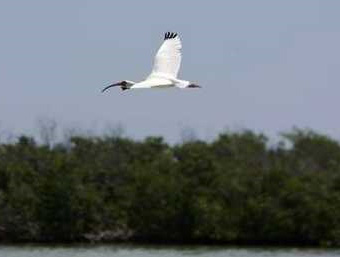
|  |  |  Editorials | Environmental Editorials | Environmental  
Mexico Eyes Climate Funds for Locally Run Forests
 Mica Rosenberg - Reuters Mica Rosenberg - Reuters
go to original
November 26, 2010


| | A White Ibis flies over a mangrove forest in Cancun June 21, 2010. In the 40 years since Cancun was founded, countless acres of mangrove forests up and down Mexico's Caribbean Coast have been lost - and the destruction continues. Now many scientists say that mangrove forests can help slow climate change, and are desperate to save them. Picture taken June 21, 2010. (Reuters/Gerardo Garcia) |  |
Agua Bendita, Mexico - Local landowners collectively running a small lumber yard in the pine forests of central Mexico say they are making profits from logging and cutting carbon emissions at the same time.

Eleven communities share one sawmill in the town of Agua Bendita, processing planks for furniture and construction and earning enough to convince them that saving the forest is better than clear-cutting for agriculture.

"The forests here have owners and the owners have the right to use the forests," Fernando Canto, a technician for the co-op, said at a control tower where members spot fires in the dry season.

Global warming, pollution and the future of forests will dominate the agenda when Mexico hosts nearly 200 nations in Cancun from Nov. 29 to Dec. 10 to try to put U.N. climate talks back on track after inconclusive discussions last year.

The cutting and burning of deforestation makes up about 10 percent of human greenhouse gas emissions, which scientists say are causing rising sea levels and extreme weather.

SMALL PLOTS AND INCOMES

Rich nations are pledging money to a U.N.-backed forest protection scheme to reduce emissions from deforestation and degradation - REDD - that could lead to a global trade in carbon credits worth $30 billion a year.

Selectively logged and managed forests capture more carbon on average than national parks, said a study released this week by Rights and Resources Initiative and the Mexican Civil Council for Sustainable Forestry, two groups that support forest collectives.

New trees cultivated after controlled cutting capture more carbon than purely old-growth forests, the study said.

Mexico has several issues that complicate the efforts.

Unlike the rest of the world, where governments largely own forested land, nearly three-quarters of Mexico's wilderness is divided into plots of group-owned property, a legacy of land reforms after the Mexican revolution in the early 1900s.

For now, most Mexicans living off the forest struggle to make ends meet. Because of the slow pace of international talks, it will be a long time until REDD-related aid flows to cooperatives like Agua Bendita, or "holy water."

"Deforestation is an economic decision. The property owner wants to change the land use precisely because the forest does not give him enough income," said Juan Torres, the head of Mexico's national forest commission.

The government has a program in 5.7 million acres (2.3 million hectares) across the country to pay a small stipend in exchange for forest protection.

"If extra income can be earned from the forest, it increases in value," said Torres. "There is motivation to conserve."

Better conservation could mean a bigger carbon sink to be traded on an eventual market if Mexico's landholders can prove they are protecting their resources.

While Mexico has steadily been able to reduce deforestation over the past decade, it still loses 580 square miles (1,500 sq km) of forest each year, an area bigger than Rome.

The residents who rely on the forests, often burdened by debt, have allowed private companies from the neighboring state of Michoacan onto their land to fell trees.

Michoacan shares the same stretch of forest but, there, illegal loggers wreak havoc on areas dangerously near the nesting ground of migrating monarch butterflies. The region is also overrun by drug traffickers.

"If one group is doing everything right and everyone else is destroying the forests, the country won't qualify for REDD," said Juan Bezaury, The Nature Conservancy's head of external affairs in Mexico. "Right now (REDD) is still a dream."

(Editing by John O'Callaghan) |

 |
|  |



